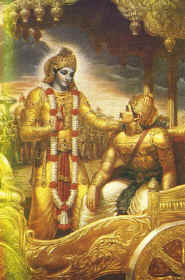[This essay was originally posted to a blog on Weebly. In transferring it I have updated and made corrections where necessary.]
[Portions of this same material were used in July 2006.]
At long last, I'm posting the third and last part of my series on "A Virtue List: Honesty, Veracity, and--now--Equanimity."
There is a famous story in the Upanishads (Svetasvatara Upanishad 4:6-7 and Mundaka Upanishad 3:1-2 tell the identical story):
"Two birds, inseparable friends, cling to the same tree. One of them eats the sweet fruit, the other looks on without eating."
Sri Sri Sri Chandrasekharendra Saraswathi commented:
"The Upanisadic story speaks of two birds perched on the branch of a pippala tree. One eats the fruit of tree while the [other] merely watches its companion without eating. The pippala tree stands for the body. The first bird represents a being that regards himself as the jivatman or individual self and the fruit it eats signifies sensual pleasure. In the same body (symbolized by the tree) the second bird is to be understood as the Paramatman [or Brahman]. He is the support of all beings but he does not know sensual pleasure. Since he does not eat the fruit he naturally does not have the same experience as the jivatman (the first). The Upanisad speaks with poetic beauty of the two birds. He who eats the fruit is the individual self, jiva, and he who does not eat is the Supreme Reality, the one who knows himself to be the Atman."
Here's a quote from Joseph Campbell (in The Power of Myth):
"There is a plane of consciousness where you can identify yourself with that which transcends pairs of opposites."
"Pairs of opposites," like good vs evil, joy vs suffering, success vs failure.
What happens, we ask, if we turn our attention from the affairs of This World to those of That? What happens when we identify ourselves, not with the bird who eats, but with the bird who watches?
Henry David Thoreau, the transcendentalist, put it like this:
"I am conscious of the presence of a part of me, which, (as it were), is not part of me, but a spectator, sharing no experience, but taking note of it..."
The cultivation of this "spectator" leads to Equanimity.
One cannot think of the story of "The Two Birds" without thinking of Lord Krishna's instructions to Arjuna in The Bhagavad Gita. In fact, many have drawn this parallel: The first bird is Arjuna, who participates in the struggles of the world. The second, then, is Krishna, who observes.
To act, and act fully and without reservation, and yet to be free of concern about the results: This is the lesson of "The Two Birds."
Comment(s):
Greg Kirk:
Dear James - this is both beautiful and meaningful. Thank you, it really develops Michael Emmanuel's post. Sending you light and love. +Greg
--------
Michael Emmanuel:
James--- I've read your virtue list. It was interesting to see the resonance with these things I've been thinking about. I've accepted some where along the way that what is is perfect. What is simply is and all that is is one thing. This very broad and all inclusive concept beyond concepts is the doorway to all virtue, as anything less than this oneness is only temporary and limited but none the less available by our choice and attention. By bringing (so to speak, because it is always present), this observer self or non-self to awareness we can develop a consciousness of a love beyond love beyond love and therefore be blessed by all we experience even when we falter from our ideas or ideals which don't belong so much to us as we to them.
Your friendly goofball. m.e.



No comments:
Post a Comment
Please leave me a message; I can't wait to hear from you!